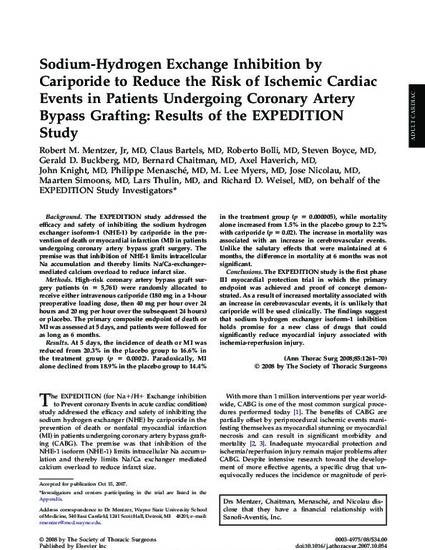
BACKGROUND: The EXPEDITION study addressed the efficacy and safety of inhibiting the sodium hydrogen exchanger isoform-1 (NHE-1) by cariporide in the prevention of death or myocardial infarction (MI) in patients undergoing coronary artery bypass graft surgery. The premise was that inhibition of NHE-1 limits intracellcular Na accumulation and thereby limits Na/Ca-exchanger-mediated calcium overload to reduce infarct size.
METHODS: High-risk coronary artery bypass graft surgery patients (n = 5,761) were randomly allocated to receive either intravenous cariporide (180 mg in a 1-hour preoperative loading dose, then 40 mg per hour over 24 hours and 20 mg per hour over the subsequent 24 hours) or placebo. The primary composite endpoint of death or MI was assessed at 5 days, and patients were followed for as long as 6 months.
RESULTS: At 5 days, the incidence of death or MI was reduced from 20.3% in the placebo group to 16.6% in the treatment group (p = 0.0002). Paradoxically, MI alone declined from 18.9% in the placebo group to 14.4% in the treatment group (p = 0.000005), while mortality alone increased from 1.5% in the placebo group to 2.2% with cariporide (p = 0.02). The increase in mortality was associated with an increase in cerebrovascular events. Unlike the salutary effects that were maintained at 6 months, the difference in mortality at 6 months was not significant.
CONCLUSIONS: The EXPEDITION study is the first phase III myocardial protection trial in which the primary endpoint was achieved and proof of concept demonstrated. As a result of increased mortality associated with an increase in cerebrovascular events, it is unlikely that cariporide will be used clinically. The findings suggest that sodium hydrogen exchanger isoform-1 inhibition holds promise for a new class of drugs that could significantly reduce myocardial injury associated with ischemia-reperfusion injury.
Mentzer RM Jr, Bartels C, Bolli R, Boyce S, Buckberg GD, Chaitman B, Haverich A, Knight J, Menasché P, Myers ML, Nicolau J, Simoons M, Thulin L, Weisel RD; EXPEDITION Study Investigators. Sodium-hydrogen exchange inhibition by cariporide to reduce the risk of ischemic cardiac events in patients undergoing coronary artery bypass grafting: results of the EXPEDITION study. Ann Thorac Surg. 2008 Apr;85(4):1261-70. doi: 10.1016/j.athoracsur.2007.10.054.
